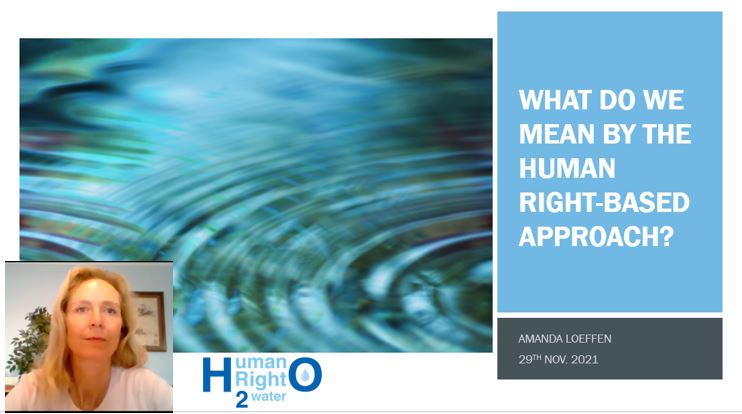
“The Human Rights-Based Approach is the mechanism by which we can achieve the SDGs in a realistic timeframe. It provides a guideline for how to engage with the local communities in a participative and inclusive manner, ensuring that there is no discrimination, and that vulnerable people are included in service provision. Without this change in mindset, then investment will continue to go to the middle-class and the not the ones that really need support”, Amanda Loeffen, CEO, HR2W
This webinar on 29th November was made in collaboration with the Water Research Commission (WRC) in South Africa, WaterShare, and with the support of the Cr Michelsen Institute in Norway. The recording will shortly be available to review here.
Speakers from South Africa, Costa Rica, Pakistan and Kenya shared their views and experiences in using a human rights based approach. The meeting was introduced by Mamohloding Thigale and facilitated by John Dini, both from WRC. In an interview with Mariano Castro and Kenneth Alfaro Alvares, hosted by Geraldine Gene, the experts from Costa Rica highlighted the examples of the ASADAS, a community-based system in Latin America, where local communitites are given the responsibility and resources to manage local water resources. Effectively providing a democratic process that involves all members of the community.
- Welcome
Mamohloding Tlhagale, WRC, Head of International and Stakeholder Engagement
- Keynote Address
Amanda Loeffen, CEO, HR2W
- HRBA for a Resilient Future
Discussion with Country Coordinators from HR2W, and facilitated by John Dini, WRC.
Costa Rica discussion Introduced by Geraldine Gene, HR2W.
Mariano Castro and Kenneth Alfaro, Costa Rica
Gabriel Oduong, Kenya
Wasif Mohammed, Pakistan
Yuri Ramkissoon, SAHRC, South Africa
4. Closure Dr Lydia Vamvakeridou-Lyroudia, Director of Watershare
Water service delivery is challenging in developing countries such as South Africa, Kenya, Pakistan, and Costa Rica. Despite adopting the human right to water in the constitution, there are often water shortages, disruptions, and lack of access to quality water.
This webinar aims to share practices using the human rights-based approach to improve water service delivery for marginalised and vulnerable people. The session will highlight practical ideas that incorporate a Human rights approach, such that the audience can learn from these experiences.
Wasif Mohammed talked about the programme for participation, training and awareness that his organisation is leading in Pakistan. Importantly, the inclusion of women and other disadvantaged groups helps to create higher awareness of their rights.
Yuri Ramkissoon from the South African Commission on Human Rights explained the importance of targetting the poorest areas for development, and making people aware that they can seek help from their local NHRI (National Human Rights Institution).
Gabriel Oduong, working in local government in Kenya, also mentioned the importance of involving community groups in decision making about local resources and infrastructure.
The session was concluded by Lydia Varevakeridou-Lyroudia from WaterShare, summarising the human rights based approach principles of participation, inclusion, non-discrimination, transparency, accountability and sustainability.
For a copy of the slides, you may access here.




